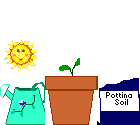|
||
|
Urban
Wastes, Farm Resource by Padma Rajagopal Financially, our farm isn't yet a viable unit. After 6 years of serious work on it, it will still take time until all the fruit trees we planted are yielding before we can entirely support ourselves from it. Local farmers who come to visit us and are impressed with the quality of the produce and the texture of the soil on our farm, are still sceptical about the financial returns. When we speak about the toxins in food and in the soil, and of the progressive degradation of chemically farmed land, they shrug and say, "That's all true, but we need money now." How can we refute this? It's never been easy to earn a decent living growing food crops, and not many villagers are satisfied with a subsistence lifestyle anymore.  Organic inputs are expensive and scarce
in the countryside, and chemical fertilizers, and the pesticides that
are mandatory for crops nourished on chemicals, are subsidised by
the government. Yes, it's true that the subsidies are directly aimed
at the manufacturers, but it's still a cheaper, instant fix for the
crops. Tomorrow be damned. "Sufficient unto the day is the evil
thereof" is the farmer's motto. But there is an alternative,
and it's found in an unexpected place - cities.
It seems I wasn't the first to think along
these lines. The Corporation Commissioner had been talking to the
local press about involving private entrepreneurs in composting garbage,
converting all this waste into a valuable resource, and providing
job opportunities to a number of people. Several people had been showing
an interest in the opportunity presented. So I decided to do what
I could to share what I know about earthworms and composting –
to spread some knowledge about an amazingly simple, layman-friendly
biotechnology, vermicomposting. Under
the aegis of SEED (Skills and Environmental Education) Trust, an NGO
that we had registered a couple of years before, I decided to organise
a workshop for potential entrepreneurs who were interested in converting
municipal solid wastes (m.s.w) to compost. Presentations made covered the technical, logistic and financial aspects of setting up vermicomposting units. A local manufacturer who had got to hear of the workshop brought and demonstrated his invention - a shredding machine that would speed up composting time by reducing the size of the material for composting - important in cities where space is limited, so a quick turnover is essential. Sadly, apart from one clerical assistant, nobody from the Municipal Corporation attended the workshop.
 |
||||||
![]()
Download the free Adobe Acrobat Reader to view files in Portable
Document Format (pdf).
Copyright © 2001 Making India Green. All Rights Reserved
Disclaimer:
All content on this site is solely for the purpose of information,
and is not an endorsement of products or services provided by external links.
Partner Sites
Natural, Herbal Health
Products
Indian Parenting Blog
Beach Holiday Blog













